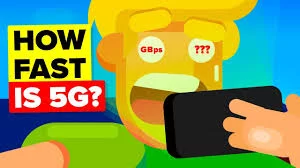How fast is 5g? This is the question that many users ask when they receive their new handset or upgrade their current handset. Average download speeds are now up to fifteen times faster than the older versions of mobile telephony services and almost twenty times faster than the earlier version of 3G technology. What is 5g technology? This is a question that a lot of users are asking these days.
The question is actually quite simple -How Fast is 5G and how much faster are you going to get your internet connection if you move from your current medium to mobile broadband? Some people are surprised to see speeds of over one hundred and twenty megabits per second when they sign on for an hour’s worth of download on an older mobile phone. And this does not include the video connection. With the latest technology on airwaves, you will be seeing download speeds of well over one hundred megabits per second as well.
How Fast is 5G?
This is the beauty of what is 5g technology; because of the way it is set up, it does not suffer from the issues that plagued older mobile networks. In the past, the telephone companies used a sort of technology that latency made the signal unreadable for the users. However, recent upgrades to the LTE networks have eliminated this issue altogether. This means that you will not experience latency when browsing the Internet or using your new mobile phones.
This is what is 5g technology in a nutshell. The main difference between what is 5g and the older systems is the frequency that the technology operates on. While the older systems used millimeter frequencies, the newer ones use Bluetooth Low Energy (BLE) frequencies. These frequencies are much faster and have much lower latency than the millimeter frequencies. This means that you will be able to browse the Internet at up to ten times faster speeds than you can do today on your standard PC.
Read more: Samsung Galaxy S21 Ultra is Planning to come with S Pen
So, how is this going to effect us? Right now, all mobile phone networks in the United States are using BLE technologies. Even AT&T is using the BLE network in the United States, and they are upgrading their current systems to allow for these newer frequencies. Because of this, anyone who has an old BLS system can use their phones on any other GSM carrier in the country without having to pay any additional cost for using BLE technology. In other words, anyone who has a smart phone (any with a base station) can take advantage of the increased bandwidth offered by what is 5g to expand their network.
This is why many companies are switching their smartphones over to 5g technology as soon as possible.

Some of these companies include:
- Verizon
- Nokia
- Samsung
- Motorola, and others.
In fact, Verizon is one of the largest users of these mobile frequencies and they are upgrading their older phones so that they can use these new frequencies. If you have an older Verizon cell phone, it may be time for an upgrade!
While you may not be able to download anything when it comes to your smartphone, you will notice that your connection speeds will be much faster when you do download applications and see complete definitions on your screens. You will also see a difference when browsing on your computer and watching videos.
Web surfers who switch over to these new technology networks will also notice a difference when downloading and seeing complete definition on their devices. Many users have already noticed the difference when it comes to downloading apps and viewing media and movies on their smartphones.
When you are looking for a mobile network provider, it is important to consider what your options are. Do you want Verizon or T-Mobile? Do you want AT&T or another company? Which company has the best deals for you? Once you have decided on which carriers offer what, you will have to figure out how to sign up for service. For how fast is 5g, you will just have to go online and check it out for yourself!






